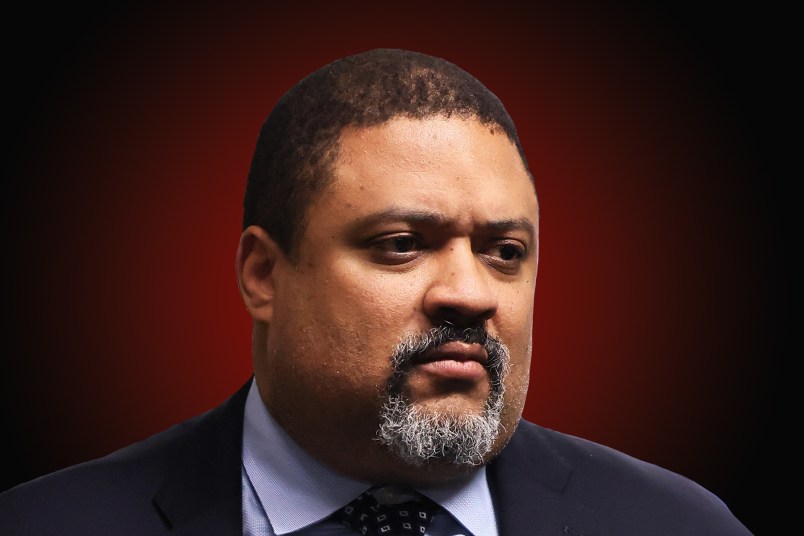President Trump’s Thursday indictment marks a historic first, but brings the United States in line with a norm that exists in many other advanced democracies.
As of Friday afternoon, the precise nature and number of charges remains unknown, but the fact of a felony indictment filed against a former head of state brings down a barrier that has stood since the country’s inception.
For nearly 250 years, no president has ever faced criminal liability for their actions. It’s not to apply an equal level of responsibility or suggest wrongdoing among them all; the decision by Manhattan District Attorney Alvin Bragg to bring charges reflects as much Trump’s own wrongdoing as it does the unique place he occupies in the hearts and minds of Americans.
Now, Trump faces a bizarre few days of limbo before his initial court appearance, which reportedly may come on Tuesday.
New York state judges typically do not release charging documents to the public until a defendant has first appeared in court. Trump is set to be processed like many other, lower-profile white collar criminal defendants; with fingerprinting, a mugshot and, perhaps, handcuffs.
Jonathan Weiler, a professor at UNC-Chapel Hill who has written extensively about authoritarianism and polarization, told TPM that he doubted the charges would have a lasting impact on Trump’s supporters, in part because everyone is so dug in.
“It’s an interesting and important element of a cult of personality, which is that your own identity is really fused with that of your leader, and so an attack on them is an attack on you, in a very fundamental way,” he said.
Some of Trump’s staunchest supporters have suggested the same.
The New York Young Republicans Club issued a widely circulated statement after the indictment, likening Trump less to an actor who wields influence on the body politic and more to the physical incarnation of political aspirations in one man.
“President Trump embodies the American people — our psyche from id to super-ego — as does no other figure; his soul is totally bonded with our core values and emotions,” the statement reads.
The charges come after a decade in the United States where politics have often revolved around frequently jarring examples of uneven application of the rule of law.
After the 2008 financial crisis, the Justice Department under Attorney General Eric Holder failed to prosecute any executives responsible for the crash. That lead to widespread outrage and disillusionment, particularly on the left, and generated the sense that one standard of justice was applied to the wealthy and well-connected, while another was reserved for the rest of us.
That was only heightened by years of protests in response to examples of police brutality being applied to Black citizens, with protests in Ferguson, Missouri and nationwide after the George Floyd murder standing as defining examples.
Richard Bowen, a Citigroup whistleblower during the crisis who met with investigators after the crisis, directed TPM to writings in which he suggested that the lack of prosecutions had a corrosive effect on trust, while granting those who benefitted from it a sense of impunity.
“I believe that the only lesson the banks learned is that no entity will hold them or their high-ranking officials accountable for future wrongdoing,” he wrote.
Trump made it explicit that he, too, believed in a two-tiered system of justice, and that he saw himself in the upper tier. He strode into office bragging about the impunity that, he believed, his political support granted him.
“I could stand in the middle of Fifth Avenue and shoot somebody and I wouldn’t lose voters,” he declared in 2016.
Much of his time in office was spent trying to swat away various criminal, civil, and congressional investigations.
An attorney representing Trump, William Consovoy, at one point argued to the 2nd Circuit Court of Appeals that were Trump to shoot someone on Fifth Avenue, he would be immune from criminal investigation until leaving office. That came as part of an attempt to quash a subpoena issued by a Manhattan grand jury convened before then-DA Cyrus Vance, Bragg’s predecessor.
It was an almost monarchical argument. Trump attorney Joe Tacopina said on Friday that he plans on filing “substantial challenges” to the indictment, suggesting that he planned to submit a motion to dismiss and, potentially, appeals.
Carissa Byrne Hessick, a law professor at UNC, wrote on Friday that much of the criticism — and praise — of Bragg revolved around prosecutorial discretion, the principle that law enforcement can decide who to charge and who to leave be.
Hessick reflected that there’s little transparency into prosecutorial decision-making, which was likely to only “add fuel” to the “political firestorm” that erupted around the indictment.
“As a country, we have enacted broadly written criminal statutes, which delegate enormous enforcement authority to prosecutors. And we have not created any mechanisms to provide transparency into how that authority is exercised,” she wrote. “We know that prosecutors routinely decline to bring charges when they have probable cause that a crime has been committed, and yet we do not know much of anything about how they use that power.”
The scope of the indictment remains unclear.
It’s known that Bragg’s office has examined Trump’s business practices via his consortium of companies, the Trump Org. He has also interviewed witnesses around the payments to two women in run-up to the 2016 election, Stormy Daniels and Karen McDougal. The two women received payments in exchange for their silence via Michael Cohen in an arrangement that partly ran through the Trump Organization itself. An attorney for the Trump Organization did not respond to TPM’s request for comment.
Trump was a business fixture in New York City for decades before entering politics, where he gained a reputation for ripping off vendors, stiffing lenders, and general unsavory practices.
Whether allegations related to those issues are included in the charges remains to be seen.



